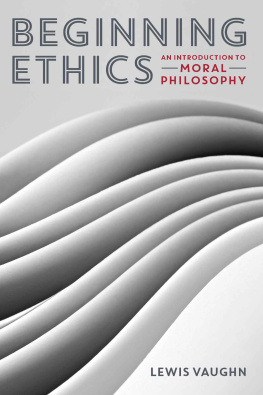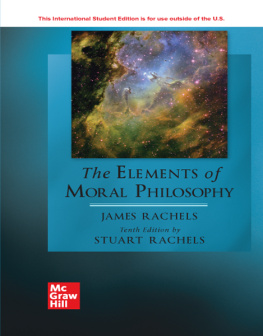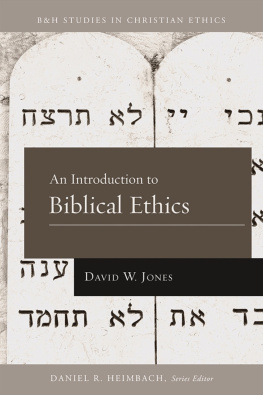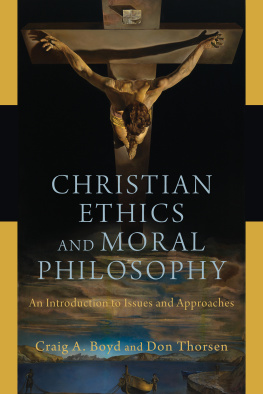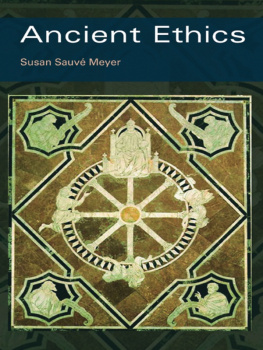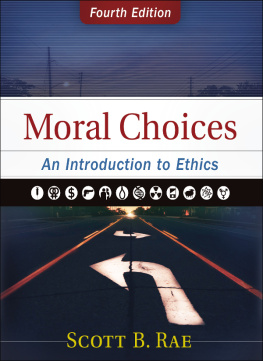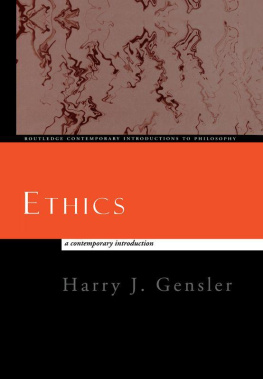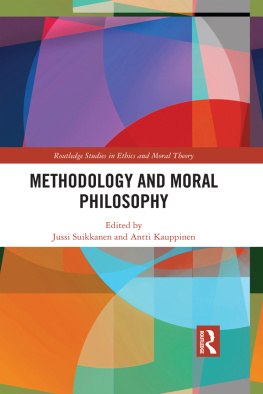Lewis Vaughn - Beginning Ethics: An Introduction to Moral Philosophy
Here you can read online Lewis Vaughn - Beginning Ethics: An Introduction to Moral Philosophy full text of the book (entire story) in english for free. Download pdf and epub, get meaning, cover and reviews about this ebook. City: New York, year: 2014, publisher: W. W. Norton & Company, genre: Religion. Description of the work, (preface) as well as reviews are available. Best literature library LitArk.com created for fans of good reading and offers a wide selection of genres:
Romance novel
Science fiction
Adventure
Detective
Science
History
Home and family
Prose
Art
Politics
Computer
Non-fiction
Religion
Business
Children
Humor
Choose a favorite category and find really read worthwhile books. Enjoy immersion in the world of imagination, feel the emotions of the characters or learn something new for yourself, make an fascinating discovery.
- Book:Beginning Ethics: An Introduction to Moral Philosophy
- Author:
- Publisher:W. W. Norton & Company
- Genre:
- Year:2014
- City:New York
- Rating:3 / 5
- Favourites:Add to favourites
- Your mark:
- 60
- 1
- 2
- 3
- 4
- 5
Beginning Ethics: An Introduction to Moral Philosophy: summary, description and annotation
We offer to read an annotation, description, summary or preface (depends on what the author of the book "Beginning Ethics: An Introduction to Moral Philosophy" wrote himself). If you haven't found the necessary information about the book — write in the comments, we will try to find it.
Lewis Vaughn: author's other books
Who wrote Beginning Ethics: An Introduction to Moral Philosophy? Find out the surname, the name of the author of the book and a list of all author's works by series.
Beginning Ethics: An Introduction to Moral Philosophy — read online for free the complete book (whole text) full work
Below is the text of the book, divided by pages. System saving the place of the last page read, allows you to conveniently read the book "Beginning Ethics: An Introduction to Moral Philosophy" online for free, without having to search again every time where you left off. Put a bookmark, and you can go to the page where you finished reading at any time.
Font size:
Interval:
Bookmark:
 B e g i n n i n g e t h i c s g An Introduction to Moral Philosophy BeginningEthics.indd 1 6/3/14 1:11 PM BeginningEthics.indd 2 6/3/14 1:11 PM B e g i n n i n g e t h i c s g An Introduction to Moral Philosophy Le w is Vaughn n w . w . n O R t O n & c O M P a n Y , i n c . n e w Y O R k L O n d O n BeginningEthics.indd 3 6/3/14 1:11 PM W. W. NORTON & COMPANY has been independent since its founding in 1923, when Wiliam Warder Norton and Mary D.
B e g i n n i n g e t h i c s g An Introduction to Moral Philosophy BeginningEthics.indd 1 6/3/14 1:11 PM BeginningEthics.indd 2 6/3/14 1:11 PM B e g i n n i n g e t h i c s g An Introduction to Moral Philosophy Le w is Vaughn n w . w . n O R t O n & c O M P a n Y , i n c . n e w Y O R k L O n d O n BeginningEthics.indd 3 6/3/14 1:11 PM W. W. NORTON & COMPANY has been independent since its founding in 1923, when Wiliam Warder Norton and Mary D.
Herter Norton first published lectures delivered at the Peoples Institute, the adult education division of New York Citys Cooper Union. The firm soon expanded its program beyond the Institute, publishing books by celebrated academics from America and abroad. By midcentury, the two major pillars of Nortons publishing programtrade books and college textswere firmly established. In the 1950s, the Norton family transferred control of the company to its employees, and todaywith a staff of four hundred and a comparable number of trade, college, and professional titles published each yearW. W. Norton & Company stands as the largest and oldest publishing house owned wholly by its employees.
Editor: Peter Simon Associate Editor: Quynh Do Manuscript Editor: JoAnn Simony Project Editor: Sujin Hong Production Manager: Ben Reynolds Text Design: Rubina Yeh Composition: Cathy Lombardi Manufacturing: CourierWestford, MA The text of this book is composed in Stone Serif ITC Std Medium with the display set in Syndor ITC Std Book. Copyright 2015 by W. W. Norton & Company, Inc. All rights reserved. Printed in the United States of America.
Library of Congress Cataloging-in-Publication Data Vaughn, Lewis, author. Beginning ethics : an introduction to moral philosophy / Lewis Vaughn. -- First edition. pages cm Includes bibliographical references and index. ISBN 978-0-393-93790-9 (pbk.) 1. I. Title. Title.
BJ1025.V38 2015 170--dc23 2014020838 W. W. Norton & Company, Inc., 500 Fifth Avenue, New York, N.Y. 10110 W. W. Norton & Company, Ltd., Castle House, 75/76 Wells Street, London W1T 3QT wwnorton.com 1 2 3 4 5 6 7 8 9 0 BeginningEthics.indd 4 6/3/14 1:11 PM c O n t e n t s g
It introduces students to basic ethical concepts (principles, virtues, values, and the like), reviews the major moral theories and arguments, critiques relativism and moral skepticism, and explains why ethics matters to students and to the world. But it also tries to take into account two barriers to ethical understanding: (1) that students approaching ethics for the first time may find it disorienting, confus ing, intimidating, perhaps even annoying (because the ideas discussed may conflict with their own); and (2) that students may have no ink ling of how to apply what they learn about moral philosophy to their lives. To address the first challenge, this text presents the material as clearly and as approachably as possible without dumbing down complex ideas and thorny problems. Moreover, students preconceptions (many of them unsupportable)preconceptions about the nature of ethics, morality and religion, moral and nonmoral claims, morality and feelings, morality and reason, moral relativism and emotivism, and moral deliberationare addressed head on. After reading these direct challenges to their uninformed views, students may or may not change their minds about them. But they wont be able to say they dont understand why ethics is regarded as a subject worthy of serious study and discussion.
The second challenge is dealt with through a strong emphasis on critical reasoning in the moral life. A key underlying message is that students are already in the thick of ethical quandaries and decision-making in their daily lives. What this book offers students is a frame work for navigating these waters more consciously and deliberately. A BeginningEthics.indd 11 6/3/14 1:11 PM 12 P R e f a c e full chapter is devoted to critical thinking as applied to ethicsthat is, to understanding and evaluating moral arguments, premises, judgments, cases, and principles. Another chapter explores the nature of moral theories and how they relate to other elements in moral deliberations. The aim of this chapter is to demonstrate how moral theories are applied in the real world and how they are critically examined using widely accepted criteria of adequacy.
In addition, each chapter contains exercises in several formsa feature that sets this book apart from other texts of its kind. Every chapter provides review questions, and Chapters 1 through 4 and 10 and 12 also have essay questions. Chapter 3 (Moral Arguments) adds argument exercises to the mix. (The argument exercises help students hone their skills in evaluating and formulating moral arguments.) And all chapters end with a set of ethical dilemmasscenarios that provide practice in applying moral concepts and theories to actual cases. The idea underlying the end-of-chapter scenarios is that one of the best ways to learn how to apply moral concepts and theories is through practice. And practice leads to a better appreciation of some of the complexities of the moral life and the potent utility of moral reasoning.
Next pageFont size:
Interval:
Bookmark:
Similar books «Beginning Ethics: An Introduction to Moral Philosophy»
Look at similar books to Beginning Ethics: An Introduction to Moral Philosophy. We have selected literature similar in name and meaning in the hope of providing readers with more options to find new, interesting, not yet read works.
Discussion, reviews of the book Beginning Ethics: An Introduction to Moral Philosophy and just readers' own opinions. Leave your comments, write what you think about the work, its meaning or the main characters. Specify what exactly you liked and what you didn't like, and why you think so.

